In today’s post: Find a free kindergarten readiness checklist you can use to determine if your child is ready to start school.
If you have a child heading to kindergarten soon, you may wonder if he or she is ready. Does he know all the things the teacher will expect him to? She can’t read yet – will she be behind all the other kids? Is he ready to be away from home for a half or full day? Should we wait one more year before sending her? It can be very stressful!
The truth is, there are some things you probably think your kid needs to know that he doesn’t, and there may be things you haven’t thought about that he should know! To help answer any questions you might have about school readiness, I’ve created a free printable kindergarten readiness checklist. This school readiness checklist covers both academic skills AND other skills kids should have before starting school: things like standing in a line, being able to zip up a coat, and taking care of all bathroom needs independently. At the end of the post you’ll also find kindergarten teachers’ answers to the question: what is the one most important thing parents can do to prepare their child for kindergarten?
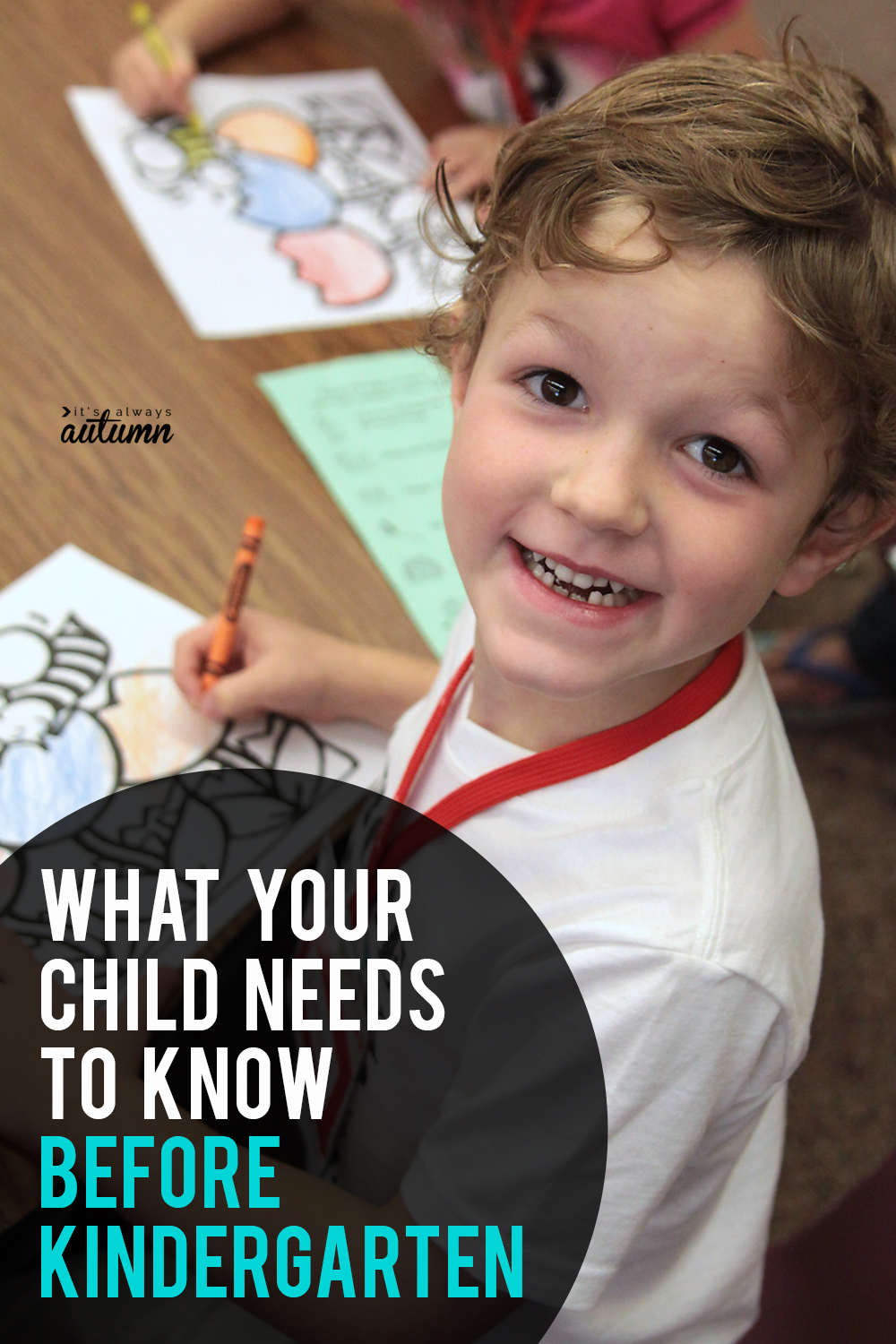
Kindergarten Checklists
If you google your state and the words “kindergarten readiness checklist” you’ll likely find a long document describing the standards for entering kindergarten in your area. Unfortunately, many of those documents are very, very long, and are full of education or government jargon that can be a little hard to understand. To create my checklist I reviewed a number of readiness documents from different states around the country and interviewed kindergarten teachers to find out what skills they think are most important for new kindergarteners to have.
Academic AND Physical Skills
Sometimes all we worry about before sending a child to her first day of school is whether she has the math skills and language skills she will need. But there are non-academic skills that are just as or more important! So I’ve created two different checklists for you to use with your child covering all the thing they should know. And don’t stress: these are very basic skills you can teach in everyday situations.
School readiness guidelines are quite consistent in different areas of the US (both from the state documents and from teacher’s reports). If you work with your child to ensure that she can do most or all of the things on both lists, you’ll know she’ll be ready to head out for her first day of school. You can download the school readiness checklists (in three different colors) at the end of this post.
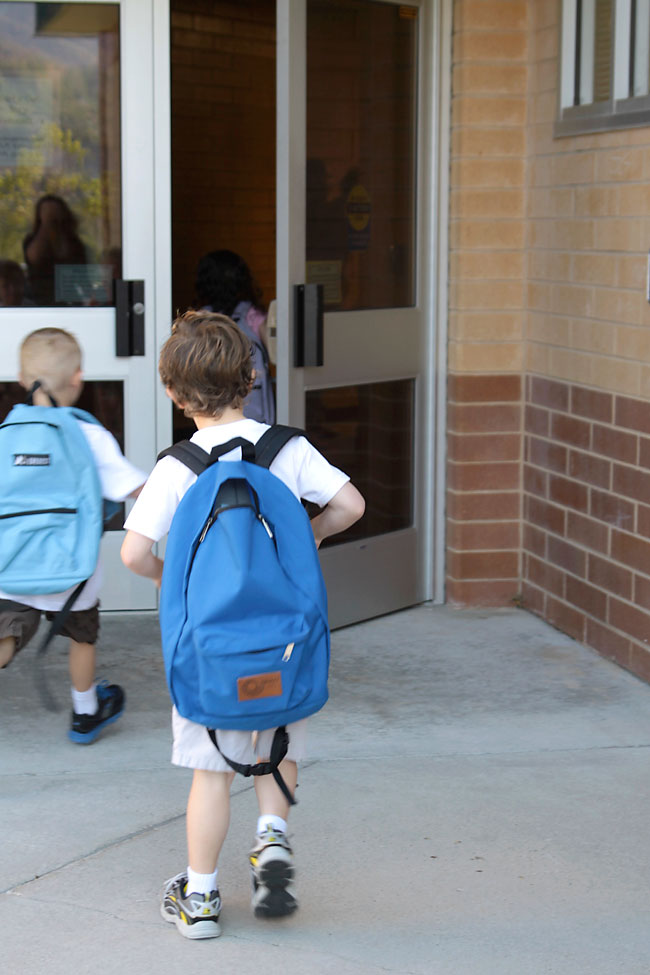
Academic Readiness
A
What academic skills should my child have before kindergarten? In order to show kindergarten readiness, your child should be able to:
- recognize and name basic shapes: square, circle, triangle, and rectangle
- recognize and name numbers 1-10, even when they are out of order
- count to 20
- count 10 objects, pointing to each one as she counts
- say or sing the alphabet
- recognize the letters of the alphabet, both uppercase and lowercase (even out of order)
- identify colors in an 8-ct crayon pack
- recognizes her own name
- write her first name
- sort items by size, color, or shape
- hold a book and turn pages
- tell if two words rhyme
- identify some letter sounds
- say her parents’ full names and phone numbers (at least one)
All the teachers I interviewed said a child doesn’t need to be reading before kindergarten (and most kids aren’t). However, children should be read to regularly by their caregiver to encourage language skills. Teaching common nursery rhymes was mentioned as a great way to get kids reading-ready: knowing how to rhyme is HUGE when it comes to learning how to read.
If your child is having trouble remembering letter sounds, I can’t tell you how much I recommend this video: LeapFrog: Letter Factory (affiliate link). It teaches the sounds of each letter in a fun and memorable way (the A’s all get scared by a monster, so they scream AAAAAH!). I’ve been absolutely AMAZED at how quickly my kids learned their letter sounds from watching it. You can get it in a combo pack with Talking Words Factory These videos are very effective!
Non Academic Readiness
What other things (non-academic) does my child need to know how to do before kindergarten? Many of these items involve physical development and practicing basic tasks in everyday situations. Your child should be able to:
- dress self, including putting on his coat and zipping it up
- tie his own shoes
- take turns and share
- sit quietly and listen
- follow simple directions
- take care of basic personal hygiene, especially being able to use the bathroom (toilet) by herself, including fastening and unfastening zippers and buttons
- put on his backpack
- hold a pencil, crayon, or markers
- use scissors to cut paper
- put things away
- hang his backpack on a hook
- wash hands with soap
- use a tissue to wipe his nose
- cough into her elbow
- stand in line
- drink from a drinking fountain
- raise his hand and wait to be called on
- open any food containers in her lunch
It’s easy to forget some of these things when you’re preparing your child for school, but imagine how much time it would take for a kindergarten teacher to help 25 kids put on coats or hang up backpacks, etc. One teacher mentioned that kids who have all the other skills become “super students” who are able to help their peers.
How Should I Use the Checklists?
You can print out these checklists and hang them up somewhere in your home. Help your child practice the items on each list, then let your child check off things as he or she masters them. If your child can’t do some of these things, work the new tasks in as part of your everyday experiences. For example, have your child practice opening her own food containers during lunch at home. Point out letters at the grocery store or when you see stop signs. Encourage your child to speak in complete sentences, and give him directions (including two-step directions) to practice following. (NOTE: if you think your child would feel overwhelmed by the idea of a checklist, just use it as a guide for yourself in what you teach.)
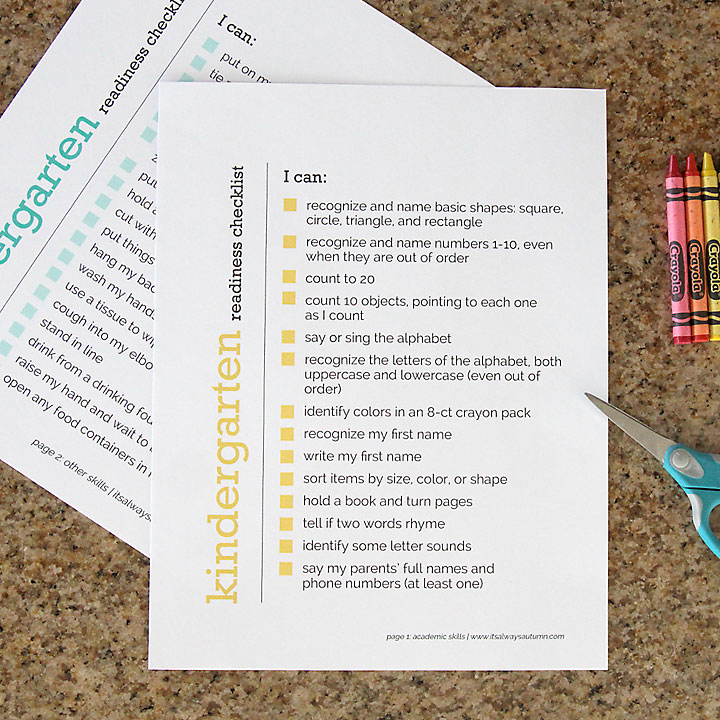
As a final note, I asked the teachers I interviewed what is the one most important thing parents can do to prepare their child for kindergarten. These are the responses I got:
- Teach kindness and respect (for rules, property, and the feelings of others).
- Expose kids to new situations, like playing at a different park or eating in a different setting.
- Do activities at home where pre-kinders have to listen without interrupting, take turns, focus on the same activity for 15 minutes, use manners, etc.
- Get used to a simple set routine or schedule.
- Read! Teach them how to hold a book, how to turn pages, point out common words, etc.
- Give them opportunities to play with other children and learn proper behavior (don’t push, take turns, etc).
- Give them some responsibilities and teach them to follow through.
- Teach nursery rhymes and songs.
- Give them chances to be away from home and family so they feel comfortable and confident when they come to school.
- Work on gross motor skills by helping them ride a tricycle, bouncing a ball back and forth, working on a simple puzzle, etc.
Download the school readiness checklists
Click these links to download the aqua version of page 1: academic skills and page 2: other skills
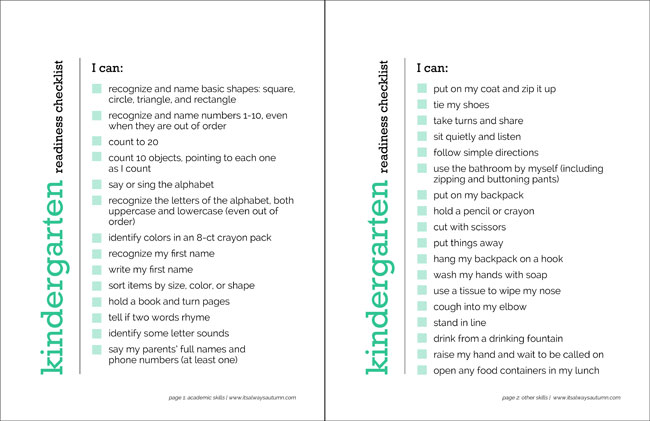
Click these links to download the red version of page 1: academic skills and page 2: other skills
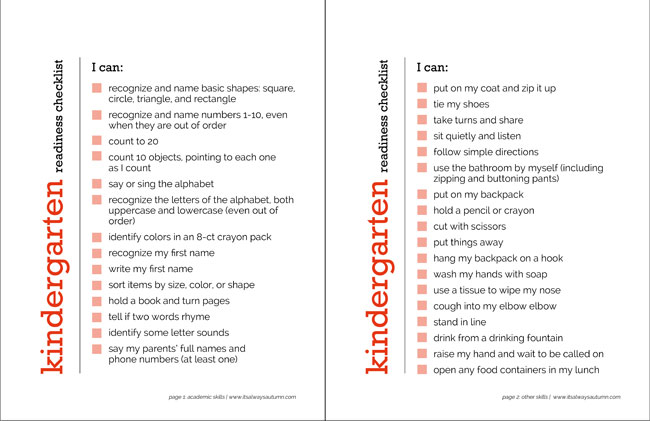
Click these links to download the yellow version of page 1: academic skills and page 2: other skills
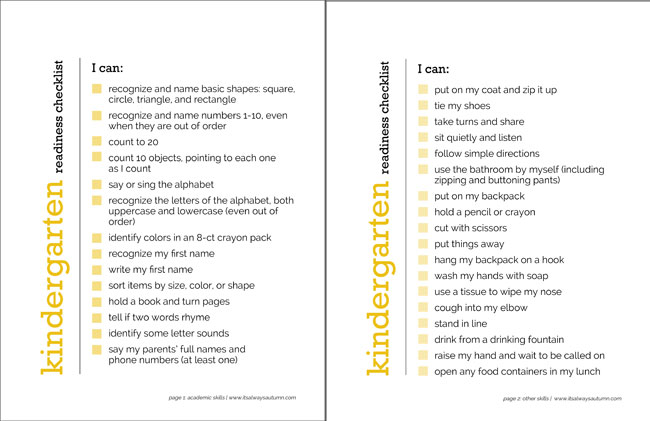

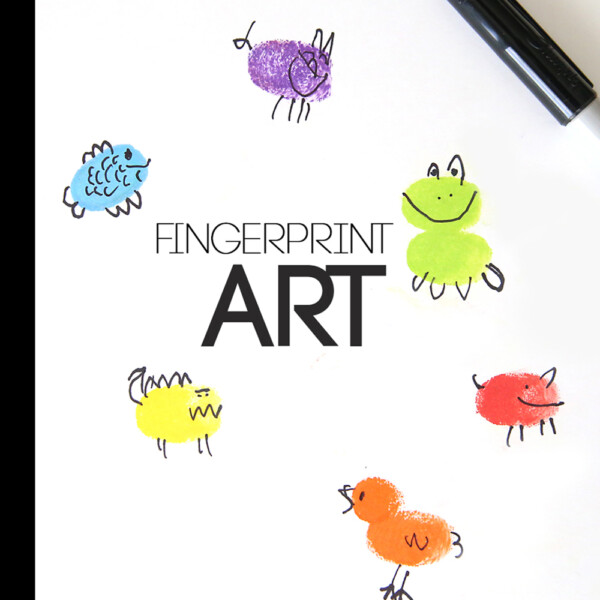
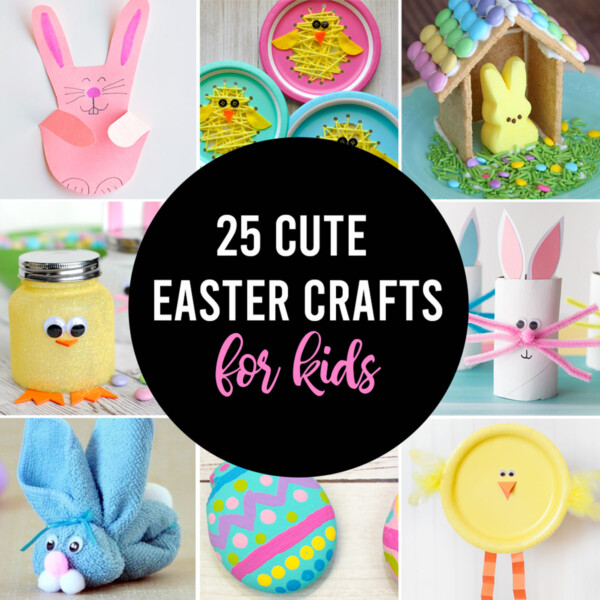
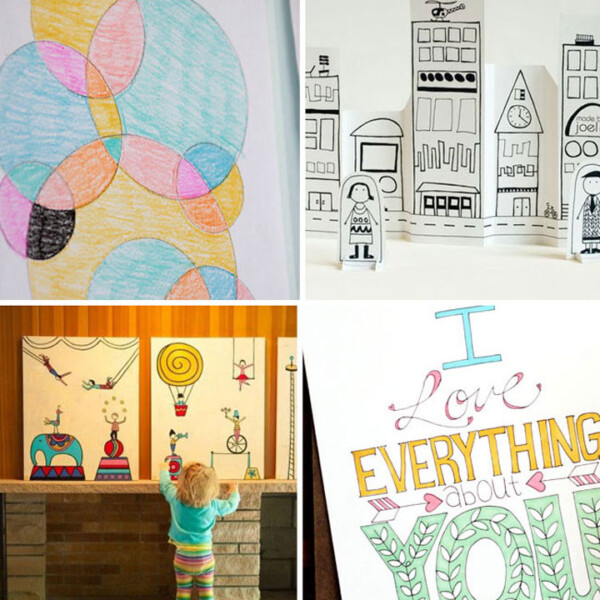

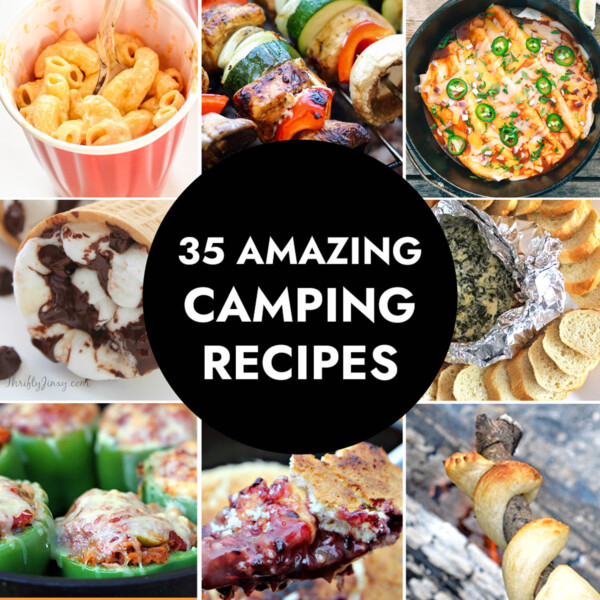
Sandy says
Just wanted to say thank you for all of this! The checklist, recommendations and explanations are so helpful for preschool type activities at home. I appreciate it!